Healthcare Assignment: Anti-Oppressive Practices, Ethical Guidelines
VerifiedAdded on 2023/01/20
|25
|7882
|73
Essay
AI Summary
This assignment delves into the critical aspects of anti-oppressive practices within the healthcare domain, emphasizing the importance of ethical considerations and guidelines. It defines anti-oppressive practice as a reflective approach that combats discrimination based on various factors, including emotional or ethnic beliefs, and promotes effective care and positive patient outcomes. The essay explores the significance of anti-discriminatory practices, highlighting the need for equal treatment and respect for all patients. It examines the impact of societal inequalities and discrimination on individuals, emphasizing the role of counselors in creating non-discriminatory environments. The assignment references key guidelines from BACP and other professional bodies, such as the American/Australian associations of psychotherapists, to provide a comprehensive overview of policies and ethical standards. It further discusses institutional discrimination, its effects on healthcare professionals, and the importance of self-awareness and reflexivity in challenging inequality. The essay underscores the need for practitioners to integrate ethical principles and values to ensure patient well-being and uphold the integrity of the profession.
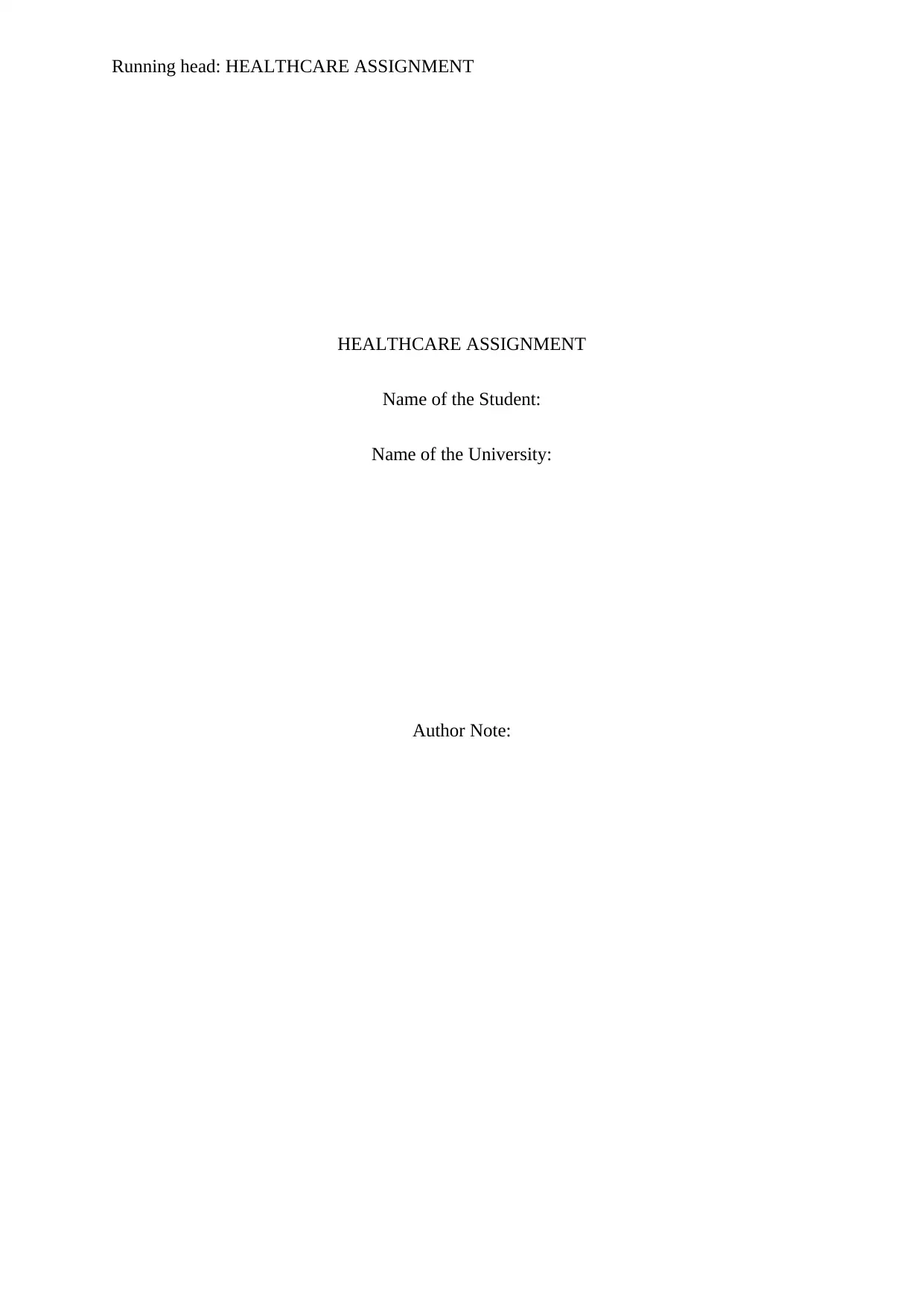
Running head: HEALTHCARE ASSIGNMENT
HEALTHCARE ASSIGNMENT
Name of the Student:
Name of the University:
Author Note:
HEALTHCARE ASSIGNMENT
Name of the Student:
Name of the University:
Author Note:
Paraphrase This Document
Need a fresh take? Get an instant paraphrase of this document with our AI Paraphraser
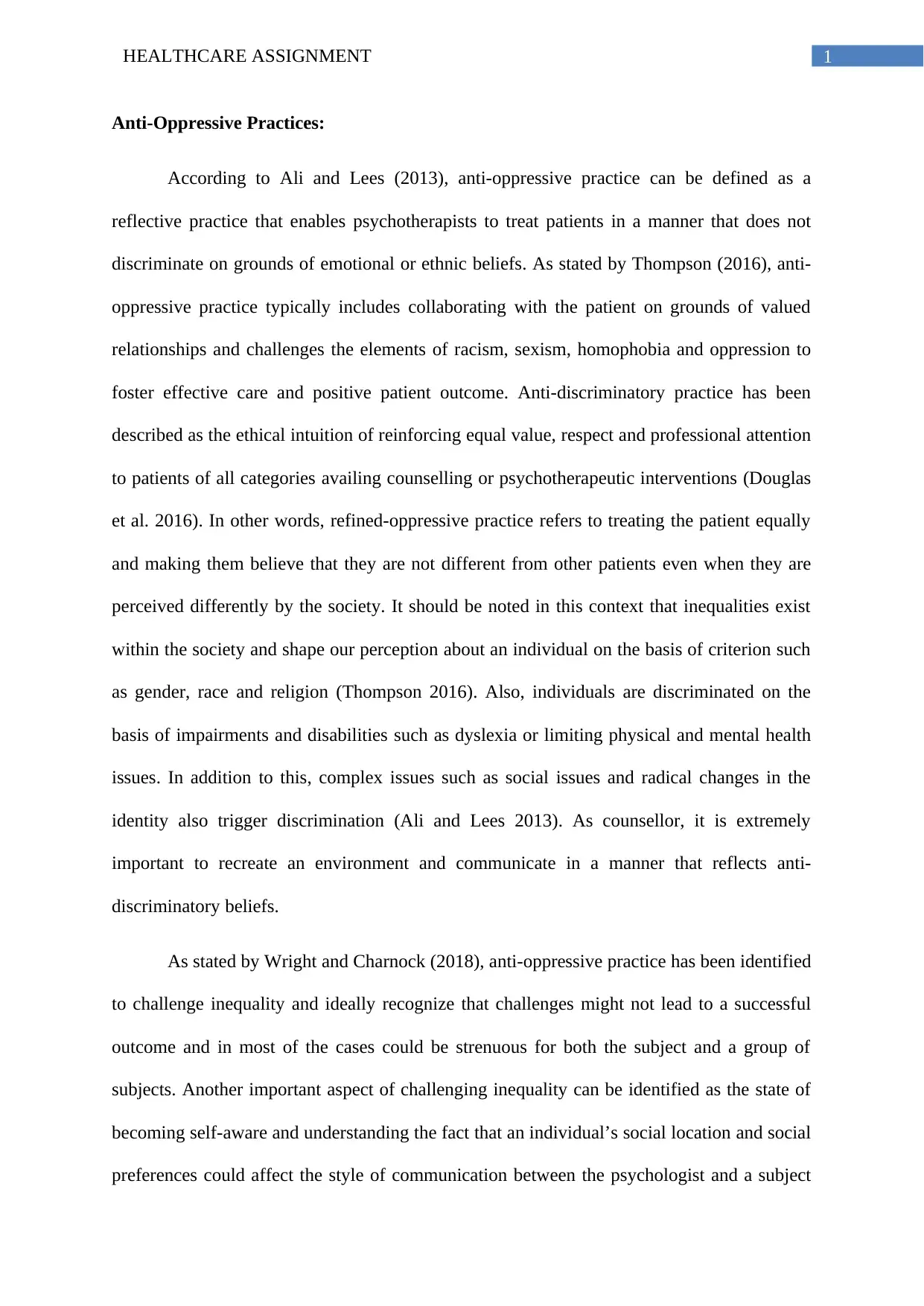
1HEALTHCARE ASSIGNMENT
Anti-Oppressive Practices:
According to Ali and Lees (2013), anti-oppressive practice can be defined as a
reflective practice that enables psychotherapists to treat patients in a manner that does not
discriminate on grounds of emotional or ethnic beliefs. As stated by Thompson (2016), anti-
oppressive practice typically includes collaborating with the patient on grounds of valued
relationships and challenges the elements of racism, sexism, homophobia and oppression to
foster effective care and positive patient outcome. Anti-discriminatory practice has been
described as the ethical intuition of reinforcing equal value, respect and professional attention
to patients of all categories availing counselling or psychotherapeutic interventions (Douglas
et al. 2016). In other words, refined-oppressive practice refers to treating the patient equally
and making them believe that they are not different from other patients even when they are
perceived differently by the society. It should be noted in this context that inequalities exist
within the society and shape our perception about an individual on the basis of criterion such
as gender, race and religion (Thompson 2016). Also, individuals are discriminated on the
basis of impairments and disabilities such as dyslexia or limiting physical and mental health
issues. In addition to this, complex issues such as social issues and radical changes in the
identity also trigger discrimination (Ali and Lees 2013). As counsellor, it is extremely
important to recreate an environment and communicate in a manner that reflects anti-
discriminatory beliefs.
As stated by Wright and Charnock (2018), anti-oppressive practice has been identified
to challenge inequality and ideally recognize that challenges might not lead to a successful
outcome and in most of the cases could be strenuous for both the subject and a group of
subjects. Another important aspect of challenging inequality can be identified as the state of
becoming self-aware and understanding the fact that an individual’s social location and social
preferences could affect the style of communication between the psychologist and a subject
Anti-Oppressive Practices:
According to Ali and Lees (2013), anti-oppressive practice can be defined as a
reflective practice that enables psychotherapists to treat patients in a manner that does not
discriminate on grounds of emotional or ethnic beliefs. As stated by Thompson (2016), anti-
oppressive practice typically includes collaborating with the patient on grounds of valued
relationships and challenges the elements of racism, sexism, homophobia and oppression to
foster effective care and positive patient outcome. Anti-discriminatory practice has been
described as the ethical intuition of reinforcing equal value, respect and professional attention
to patients of all categories availing counselling or psychotherapeutic interventions (Douglas
et al. 2016). In other words, refined-oppressive practice refers to treating the patient equally
and making them believe that they are not different from other patients even when they are
perceived differently by the society. It should be noted in this context that inequalities exist
within the society and shape our perception about an individual on the basis of criterion such
as gender, race and religion (Thompson 2016). Also, individuals are discriminated on the
basis of impairments and disabilities such as dyslexia or limiting physical and mental health
issues. In addition to this, complex issues such as social issues and radical changes in the
identity also trigger discrimination (Ali and Lees 2013). As counsellor, it is extremely
important to recreate an environment and communicate in a manner that reflects anti-
discriminatory beliefs.
As stated by Wright and Charnock (2018), anti-oppressive practice has been identified
to challenge inequality and ideally recognize that challenges might not lead to a successful
outcome and in most of the cases could be strenuous for both the subject and a group of
subjects. Another important aspect of challenging inequality can be identified as the state of
becoming self-aware and understanding the fact that an individual’s social location and social
preferences could affect the style of communication between the psychologist and a subject
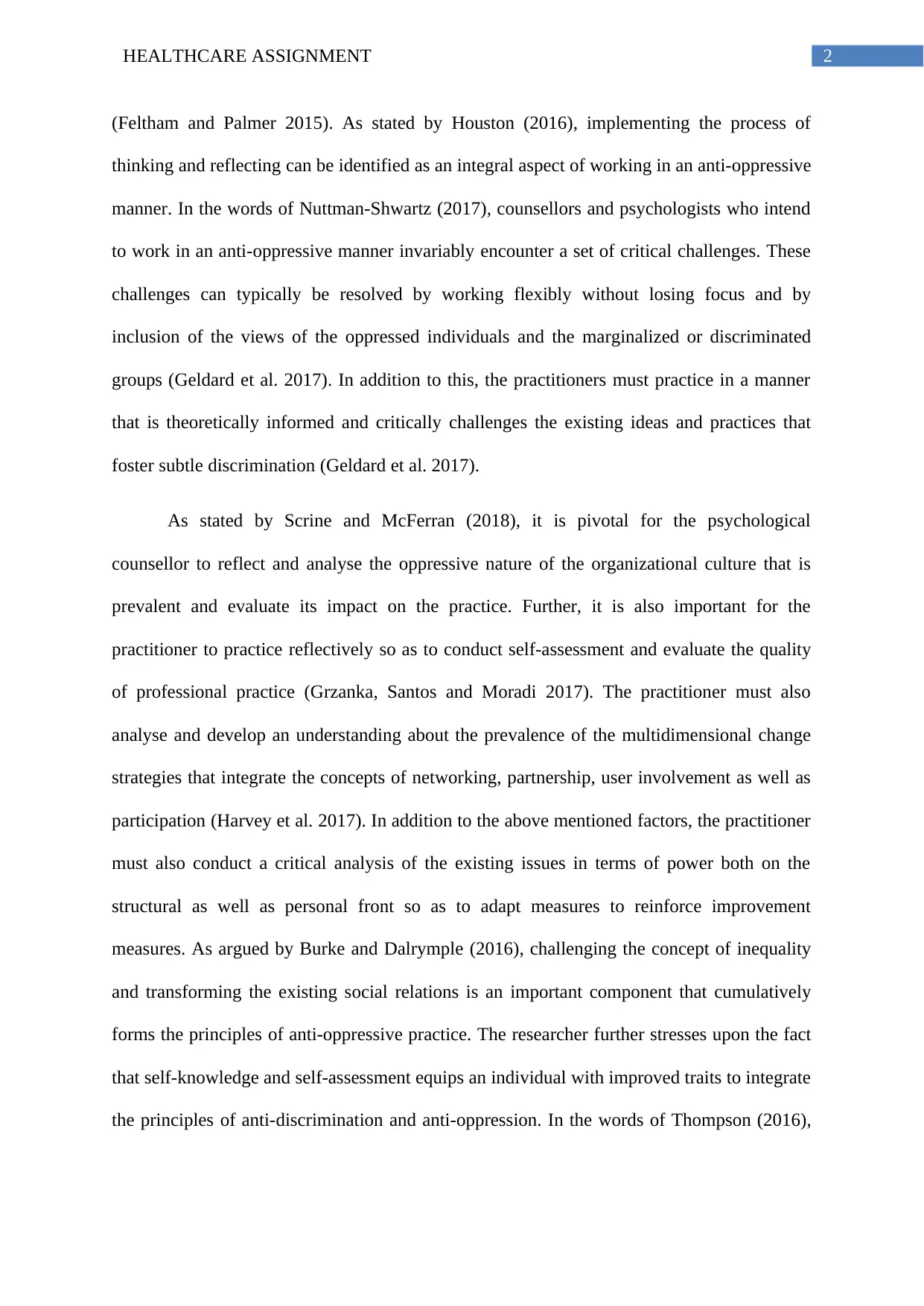
2HEALTHCARE ASSIGNMENT
(Feltham and Palmer 2015). As stated by Houston (2016), implementing the process of
thinking and reflecting can be identified as an integral aspect of working in an anti-oppressive
manner. In the words of Nuttman-Shwartz (2017), counsellors and psychologists who intend
to work in an anti-oppressive manner invariably encounter a set of critical challenges. These
challenges can typically be resolved by working flexibly without losing focus and by
inclusion of the views of the oppressed individuals and the marginalized or discriminated
groups (Geldard et al. 2017). In addition to this, the practitioners must practice in a manner
that is theoretically informed and critically challenges the existing ideas and practices that
foster subtle discrimination (Geldard et al. 2017).
As stated by Scrine and McFerran (2018), it is pivotal for the psychological
counsellor to reflect and analyse the oppressive nature of the organizational culture that is
prevalent and evaluate its impact on the practice. Further, it is also important for the
practitioner to practice reflectively so as to conduct self-assessment and evaluate the quality
of professional practice (Grzanka, Santos and Moradi 2017). The practitioner must also
analyse and develop an understanding about the prevalence of the multidimensional change
strategies that integrate the concepts of networking, partnership, user involvement as well as
participation (Harvey et al. 2017). In addition to the above mentioned factors, the practitioner
must also conduct a critical analysis of the existing issues in terms of power both on the
structural as well as personal front so as to adapt measures to reinforce improvement
measures. As argued by Burke and Dalrymple (2016), challenging the concept of inequality
and transforming the existing social relations is an important component that cumulatively
forms the principles of anti-oppressive practice. The researcher further stresses upon the fact
that self-knowledge and self-assessment equips an individual with improved traits to integrate
the principles of anti-discrimination and anti-oppression. In the words of Thompson (2016),
(Feltham and Palmer 2015). As stated by Houston (2016), implementing the process of
thinking and reflecting can be identified as an integral aspect of working in an anti-oppressive
manner. In the words of Nuttman-Shwartz (2017), counsellors and psychologists who intend
to work in an anti-oppressive manner invariably encounter a set of critical challenges. These
challenges can typically be resolved by working flexibly without losing focus and by
inclusion of the views of the oppressed individuals and the marginalized or discriminated
groups (Geldard et al. 2017). In addition to this, the practitioners must practice in a manner
that is theoretically informed and critically challenges the existing ideas and practices that
foster subtle discrimination (Geldard et al. 2017).
As stated by Scrine and McFerran (2018), it is pivotal for the psychological
counsellor to reflect and analyse the oppressive nature of the organizational culture that is
prevalent and evaluate its impact on the practice. Further, it is also important for the
practitioner to practice reflectively so as to conduct self-assessment and evaluate the quality
of professional practice (Grzanka, Santos and Moradi 2017). The practitioner must also
analyse and develop an understanding about the prevalence of the multidimensional change
strategies that integrate the concepts of networking, partnership, user involvement as well as
participation (Harvey et al. 2017). In addition to the above mentioned factors, the practitioner
must also conduct a critical analysis of the existing issues in terms of power both on the
structural as well as personal front so as to adapt measures to reinforce improvement
measures. As argued by Burke and Dalrymple (2016), challenging the concept of inequality
and transforming the existing social relations is an important component that cumulatively
forms the principles of anti-oppressive practice. The researcher further stresses upon the fact
that self-knowledge and self-assessment equips an individual with improved traits to integrate
the principles of anti-discrimination and anti-oppression. In the words of Thompson (2016),
⊘ This is a preview!⊘
Do you want full access?
Subscribe today to unlock all pages.

Trusted by 1+ million students worldwide
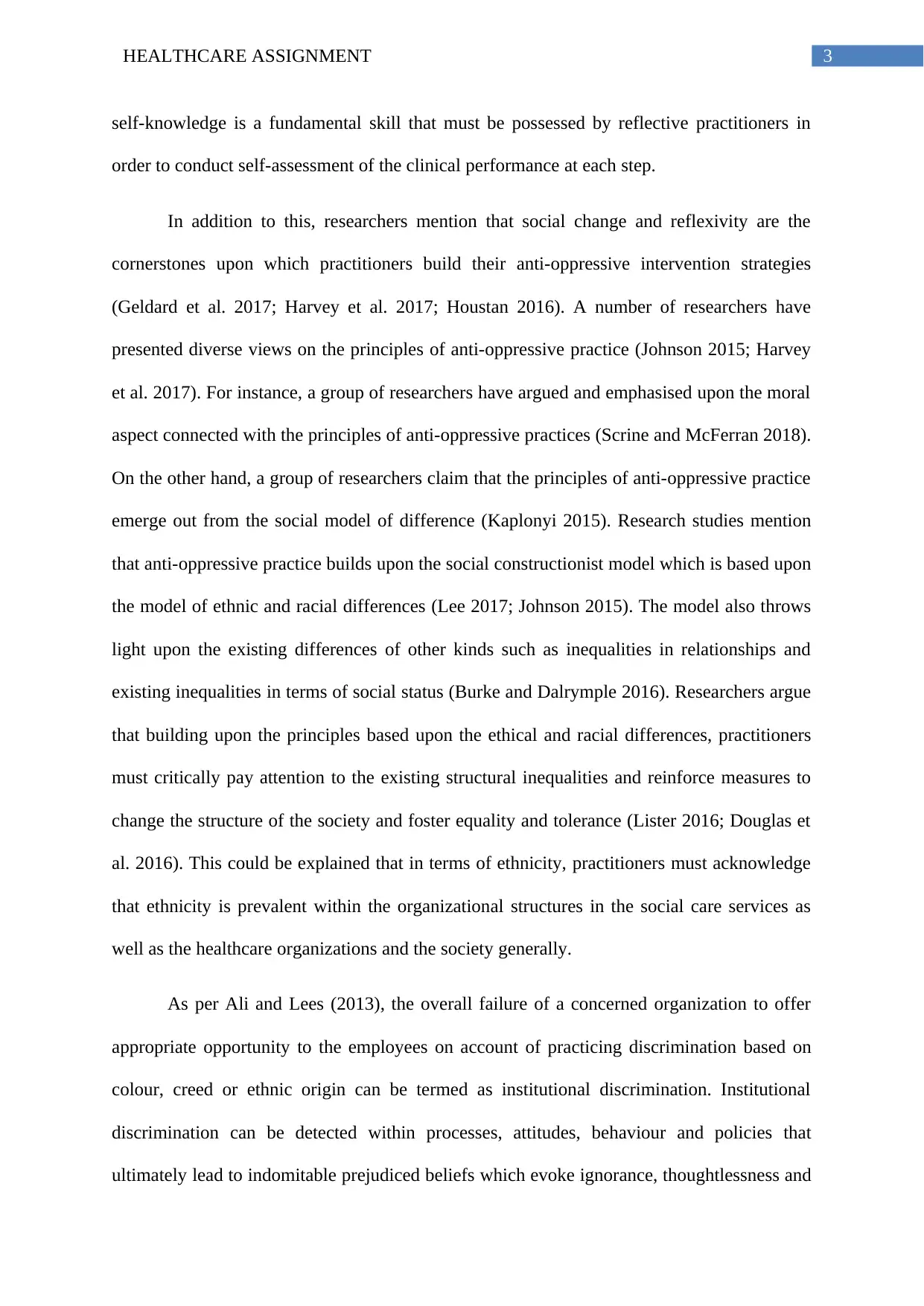
3HEALTHCARE ASSIGNMENT
self-knowledge is a fundamental skill that must be possessed by reflective practitioners in
order to conduct self-assessment of the clinical performance at each step.
In addition to this, researchers mention that social change and reflexivity are the
cornerstones upon which practitioners build their anti-oppressive intervention strategies
(Geldard et al. 2017; Harvey et al. 2017; Houstan 2016). A number of researchers have
presented diverse views on the principles of anti-oppressive practice (Johnson 2015; Harvey
et al. 2017). For instance, a group of researchers have argued and emphasised upon the moral
aspect connected with the principles of anti-oppressive practices (Scrine and McFerran 2018).
On the other hand, a group of researchers claim that the principles of anti-oppressive practice
emerge out from the social model of difference (Kaplonyi 2015). Research studies mention
that anti-oppressive practice builds upon the social constructionist model which is based upon
the model of ethnic and racial differences (Lee 2017; Johnson 2015). The model also throws
light upon the existing differences of other kinds such as inequalities in relationships and
existing inequalities in terms of social status (Burke and Dalrymple 2016). Researchers argue
that building upon the principles based upon the ethical and racial differences, practitioners
must critically pay attention to the existing structural inequalities and reinforce measures to
change the structure of the society and foster equality and tolerance (Lister 2016; Douglas et
al. 2016). This could be explained that in terms of ethnicity, practitioners must acknowledge
that ethnicity is prevalent within the organizational structures in the social care services as
well as the healthcare organizations and the society generally.
As per Ali and Lees (2013), the overall failure of a concerned organization to offer
appropriate opportunity to the employees on account of practicing discrimination based on
colour, creed or ethnic origin can be termed as institutional discrimination. Institutional
discrimination can be detected within processes, attitudes, behaviour and policies that
ultimately lead to indomitable prejudiced beliefs which evoke ignorance, thoughtlessness and
self-knowledge is a fundamental skill that must be possessed by reflective practitioners in
order to conduct self-assessment of the clinical performance at each step.
In addition to this, researchers mention that social change and reflexivity are the
cornerstones upon which practitioners build their anti-oppressive intervention strategies
(Geldard et al. 2017; Harvey et al. 2017; Houstan 2016). A number of researchers have
presented diverse views on the principles of anti-oppressive practice (Johnson 2015; Harvey
et al. 2017). For instance, a group of researchers have argued and emphasised upon the moral
aspect connected with the principles of anti-oppressive practices (Scrine and McFerran 2018).
On the other hand, a group of researchers claim that the principles of anti-oppressive practice
emerge out from the social model of difference (Kaplonyi 2015). Research studies mention
that anti-oppressive practice builds upon the social constructionist model which is based upon
the model of ethnic and racial differences (Lee 2017; Johnson 2015). The model also throws
light upon the existing differences of other kinds such as inequalities in relationships and
existing inequalities in terms of social status (Burke and Dalrymple 2016). Researchers argue
that building upon the principles based upon the ethical and racial differences, practitioners
must critically pay attention to the existing structural inequalities and reinforce measures to
change the structure of the society and foster equality and tolerance (Lister 2016; Douglas et
al. 2016). This could be explained that in terms of ethnicity, practitioners must acknowledge
that ethnicity is prevalent within the organizational structures in the social care services as
well as the healthcare organizations and the society generally.
As per Ali and Lees (2013), the overall failure of a concerned organization to offer
appropriate opportunity to the employees on account of practicing discrimination based on
colour, creed or ethnic origin can be termed as institutional discrimination. Institutional
discrimination can be detected within processes, attitudes, behaviour and policies that
ultimately lead to indomitable prejudiced beliefs which evoke ignorance, thoughtlessness and
Paraphrase This Document
Need a fresh take? Get an instant paraphrase of this document with our AI Paraphraser
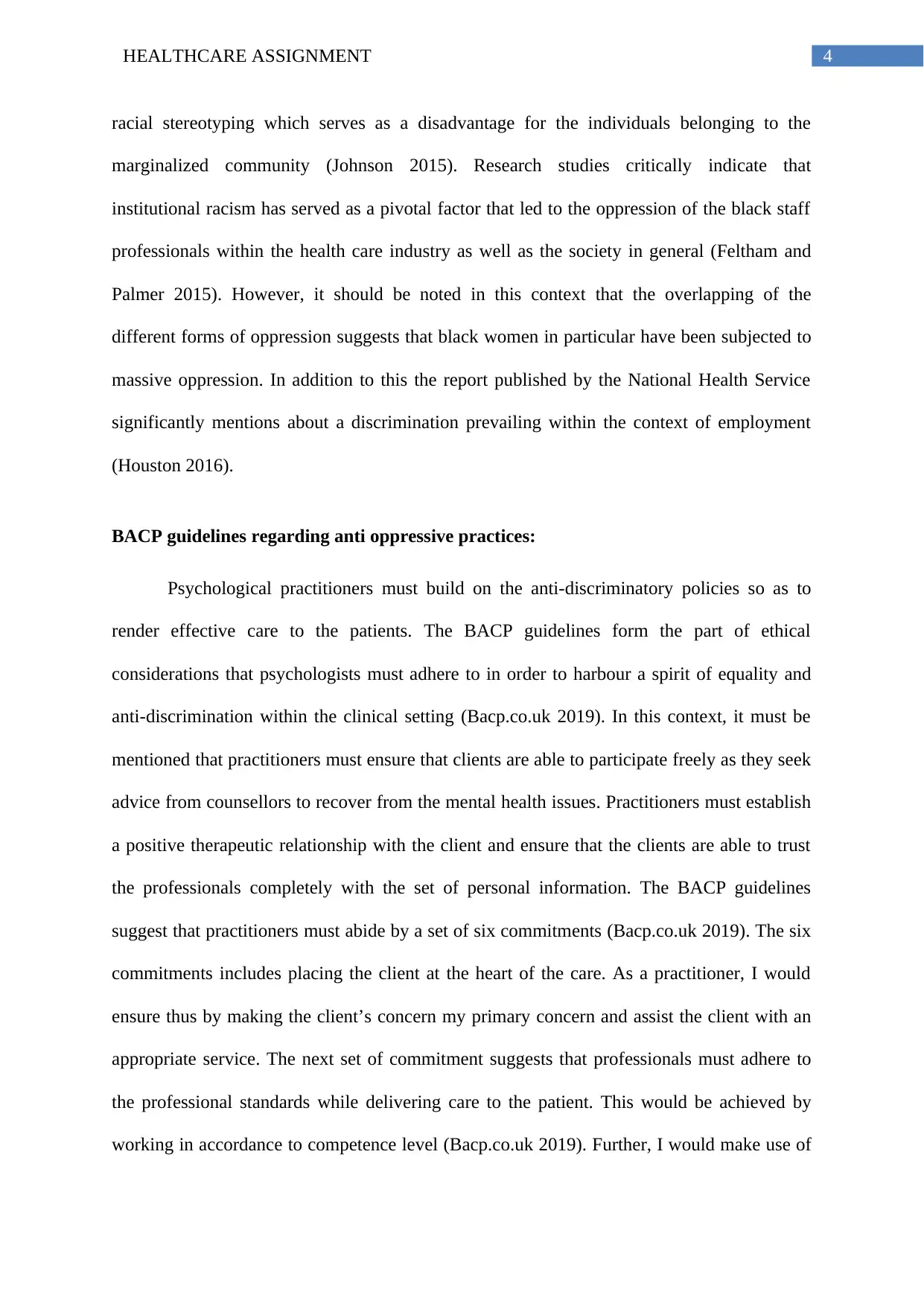
4HEALTHCARE ASSIGNMENT
racial stereotyping which serves as a disadvantage for the individuals belonging to the
marginalized community (Johnson 2015). Research studies critically indicate that
institutional racism has served as a pivotal factor that led to the oppression of the black staff
professionals within the health care industry as well as the society in general (Feltham and
Palmer 2015). However, it should be noted in this context that the overlapping of the
different forms of oppression suggests that black women in particular have been subjected to
massive oppression. In addition to this the report published by the National Health Service
significantly mentions about a discrimination prevailing within the context of employment
(Houston 2016).
BACP guidelines regarding anti oppressive practices:
Psychological practitioners must build on the anti-discriminatory policies so as to
render effective care to the patients. The BACP guidelines form the part of ethical
considerations that psychologists must adhere to in order to harbour a spirit of equality and
anti-discrimination within the clinical setting (Bacp.co.uk 2019). In this context, it must be
mentioned that practitioners must ensure that clients are able to participate freely as they seek
advice from counsellors to recover from the mental health issues. Practitioners must establish
a positive therapeutic relationship with the client and ensure that the clients are able to trust
the professionals completely with the set of personal information. The BACP guidelines
suggest that practitioners must abide by a set of six commitments (Bacp.co.uk 2019). The six
commitments includes placing the client at the heart of the care. As a practitioner, I would
ensure thus by making the client’s concern my primary concern and assist the client with an
appropriate service. The next set of commitment suggests that professionals must adhere to
the professional standards while delivering care to the patient. This would be achieved by
working in accordance to competence level (Bacp.co.uk 2019). Further, I would make use of
racial stereotyping which serves as a disadvantage for the individuals belonging to the
marginalized community (Johnson 2015). Research studies critically indicate that
institutional racism has served as a pivotal factor that led to the oppression of the black staff
professionals within the health care industry as well as the society in general (Feltham and
Palmer 2015). However, it should be noted in this context that the overlapping of the
different forms of oppression suggests that black women in particular have been subjected to
massive oppression. In addition to this the report published by the National Health Service
significantly mentions about a discrimination prevailing within the context of employment
(Houston 2016).
BACP guidelines regarding anti oppressive practices:
Psychological practitioners must build on the anti-discriminatory policies so as to
render effective care to the patients. The BACP guidelines form the part of ethical
considerations that psychologists must adhere to in order to harbour a spirit of equality and
anti-discrimination within the clinical setting (Bacp.co.uk 2019). In this context, it must be
mentioned that practitioners must ensure that clients are able to participate freely as they seek
advice from counsellors to recover from the mental health issues. Practitioners must establish
a positive therapeutic relationship with the client and ensure that the clients are able to trust
the professionals completely with the set of personal information. The BACP guidelines
suggest that practitioners must abide by a set of six commitments (Bacp.co.uk 2019). The six
commitments includes placing the client at the heart of the care. As a practitioner, I would
ensure thus by making the client’s concern my primary concern and assist the client with an
appropriate service. The next set of commitment suggests that professionals must adhere to
the professional standards while delivering care to the patient. This would be achieved by
working in accordance to competence level (Bacp.co.uk 2019). Further, I would make use of
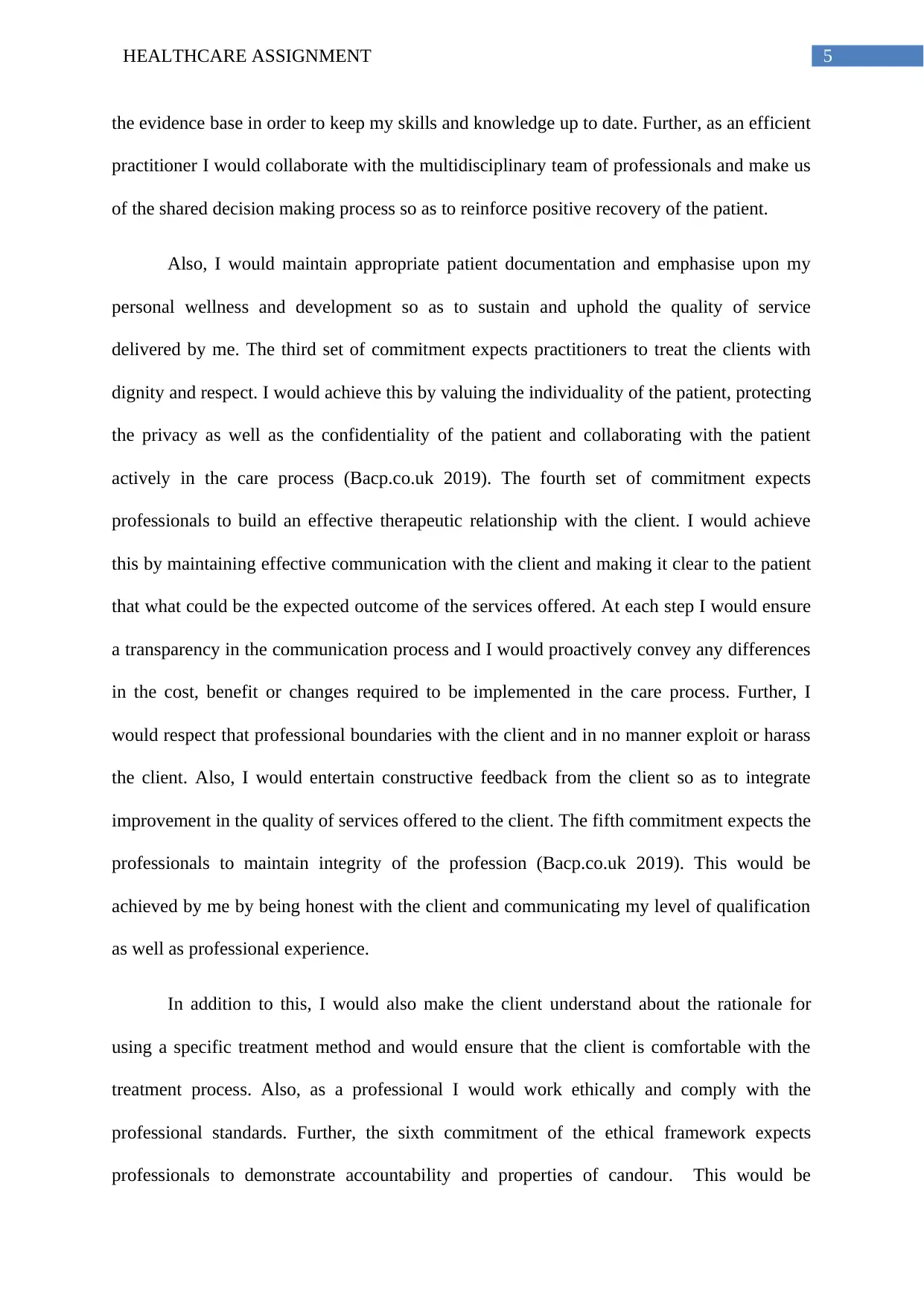
5HEALTHCARE ASSIGNMENT
the evidence base in order to keep my skills and knowledge up to date. Further, as an efficient
practitioner I would collaborate with the multidisciplinary team of professionals and make us
of the shared decision making process so as to reinforce positive recovery of the patient.
Also, I would maintain appropriate patient documentation and emphasise upon my
personal wellness and development so as to sustain and uphold the quality of service
delivered by me. The third set of commitment expects practitioners to treat the clients with
dignity and respect. I would achieve this by valuing the individuality of the patient, protecting
the privacy as well as the confidentiality of the patient and collaborating with the patient
actively in the care process (Bacp.co.uk 2019). The fourth set of commitment expects
professionals to build an effective therapeutic relationship with the client. I would achieve
this by maintaining effective communication with the client and making it clear to the patient
that what could be the expected outcome of the services offered. At each step I would ensure
a transparency in the communication process and I would proactively convey any differences
in the cost, benefit or changes required to be implemented in the care process. Further, I
would respect that professional boundaries with the client and in no manner exploit or harass
the client. Also, I would entertain constructive feedback from the client so as to integrate
improvement in the quality of services offered to the client. The fifth commitment expects the
professionals to maintain integrity of the profession (Bacp.co.uk 2019). This would be
achieved by me by being honest with the client and communicating my level of qualification
as well as professional experience.
In addition to this, I would also make the client understand about the rationale for
using a specific treatment method and would ensure that the client is comfortable with the
treatment process. Also, as a professional I would work ethically and comply with the
professional standards. Further, the sixth commitment of the ethical framework expects
professionals to demonstrate accountability and properties of candour. This would be
the evidence base in order to keep my skills and knowledge up to date. Further, as an efficient
practitioner I would collaborate with the multidisciplinary team of professionals and make us
of the shared decision making process so as to reinforce positive recovery of the patient.
Also, I would maintain appropriate patient documentation and emphasise upon my
personal wellness and development so as to sustain and uphold the quality of service
delivered by me. The third set of commitment expects practitioners to treat the clients with
dignity and respect. I would achieve this by valuing the individuality of the patient, protecting
the privacy as well as the confidentiality of the patient and collaborating with the patient
actively in the care process (Bacp.co.uk 2019). The fourth set of commitment expects
professionals to build an effective therapeutic relationship with the client. I would achieve
this by maintaining effective communication with the client and making it clear to the patient
that what could be the expected outcome of the services offered. At each step I would ensure
a transparency in the communication process and I would proactively convey any differences
in the cost, benefit or changes required to be implemented in the care process. Further, I
would respect that professional boundaries with the client and in no manner exploit or harass
the client. Also, I would entertain constructive feedback from the client so as to integrate
improvement in the quality of services offered to the client. The fifth commitment expects the
professionals to maintain integrity of the profession (Bacp.co.uk 2019). This would be
achieved by me by being honest with the client and communicating my level of qualification
as well as professional experience.
In addition to this, I would also make the client understand about the rationale for
using a specific treatment method and would ensure that the client is comfortable with the
treatment process. Also, as a professional I would work ethically and comply with the
professional standards. Further, the sixth commitment of the ethical framework expects
professionals to demonstrate accountability and properties of candour. This would be
⊘ This is a preview!⊘
Do you want full access?
Subscribe today to unlock all pages.

Trusted by 1+ million students worldwide
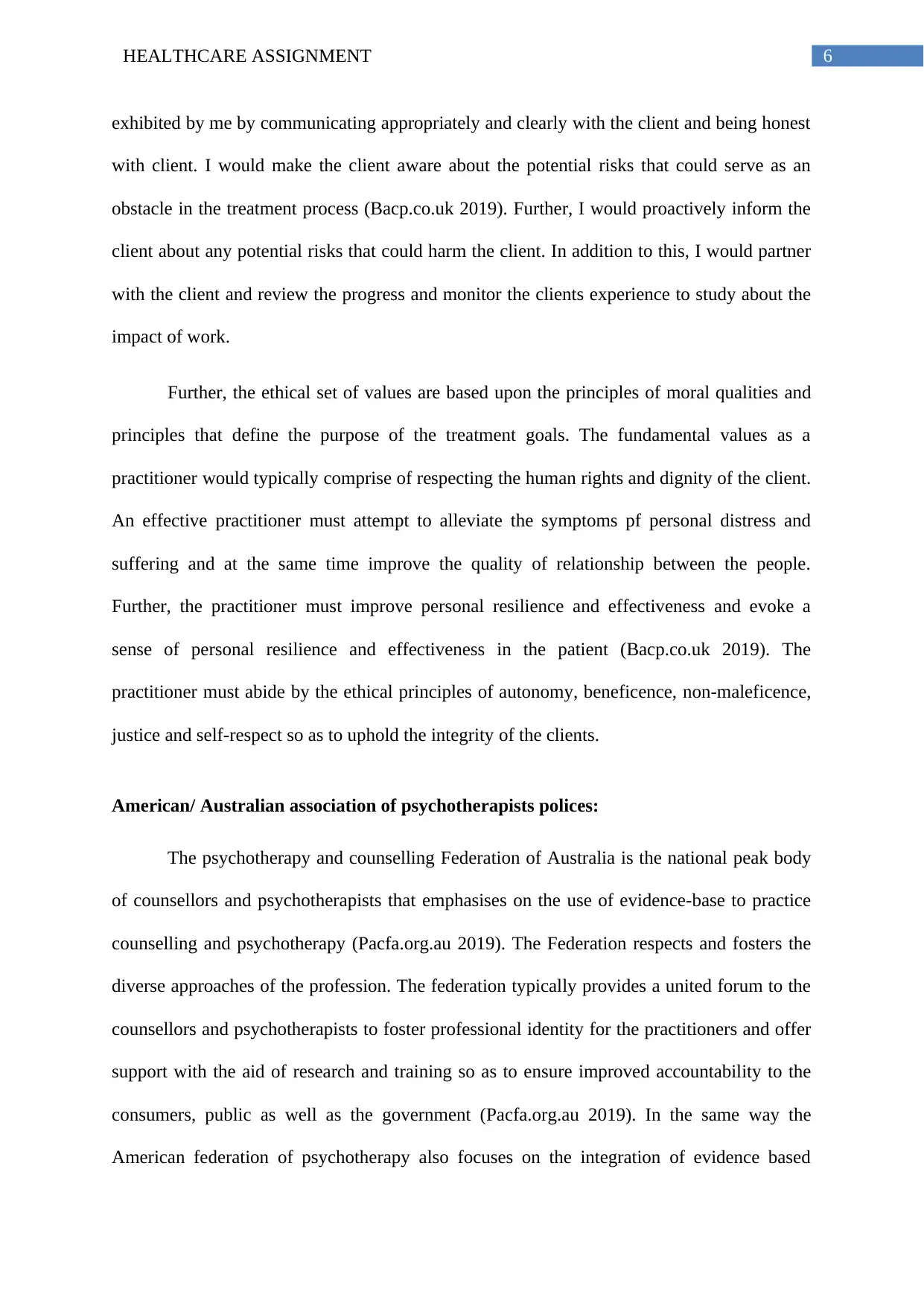
6HEALTHCARE ASSIGNMENT
exhibited by me by communicating appropriately and clearly with the client and being honest
with client. I would make the client aware about the potential risks that could serve as an
obstacle in the treatment process (Bacp.co.uk 2019). Further, I would proactively inform the
client about any potential risks that could harm the client. In addition to this, I would partner
with the client and review the progress and monitor the clients experience to study about the
impact of work.
Further, the ethical set of values are based upon the principles of moral qualities and
principles that define the purpose of the treatment goals. The fundamental values as a
practitioner would typically comprise of respecting the human rights and dignity of the client.
An effective practitioner must attempt to alleviate the symptoms pf personal distress and
suffering and at the same time improve the quality of relationship between the people.
Further, the practitioner must improve personal resilience and effectiveness and evoke a
sense of personal resilience and effectiveness in the patient (Bacp.co.uk 2019). The
practitioner must abide by the ethical principles of autonomy, beneficence, non-maleficence,
justice and self-respect so as to uphold the integrity of the clients.
American/ Australian association of psychotherapists polices:
The psychotherapy and counselling Federation of Australia is the national peak body
of counsellors and psychotherapists that emphasises on the use of evidence-base to practice
counselling and psychotherapy (Pacfa.org.au 2019). The Federation respects and fosters the
diverse approaches of the profession. The federation typically provides a united forum to the
counsellors and psychotherapists to foster professional identity for the practitioners and offer
support with the aid of research and training so as to ensure improved accountability to the
consumers, public as well as the government (Pacfa.org.au 2019). In the same way the
American federation of psychotherapy also focuses on the integration of evidence based
exhibited by me by communicating appropriately and clearly with the client and being honest
with client. I would make the client aware about the potential risks that could serve as an
obstacle in the treatment process (Bacp.co.uk 2019). Further, I would proactively inform the
client about any potential risks that could harm the client. In addition to this, I would partner
with the client and review the progress and monitor the clients experience to study about the
impact of work.
Further, the ethical set of values are based upon the principles of moral qualities and
principles that define the purpose of the treatment goals. The fundamental values as a
practitioner would typically comprise of respecting the human rights and dignity of the client.
An effective practitioner must attempt to alleviate the symptoms pf personal distress and
suffering and at the same time improve the quality of relationship between the people.
Further, the practitioner must improve personal resilience and effectiveness and evoke a
sense of personal resilience and effectiveness in the patient (Bacp.co.uk 2019). The
practitioner must abide by the ethical principles of autonomy, beneficence, non-maleficence,
justice and self-respect so as to uphold the integrity of the clients.
American/ Australian association of psychotherapists polices:
The psychotherapy and counselling Federation of Australia is the national peak body
of counsellors and psychotherapists that emphasises on the use of evidence-base to practice
counselling and psychotherapy (Pacfa.org.au 2019). The Federation respects and fosters the
diverse approaches of the profession. The federation typically provides a united forum to the
counsellors and psychotherapists to foster professional identity for the practitioners and offer
support with the aid of research and training so as to ensure improved accountability to the
consumers, public as well as the government (Pacfa.org.au 2019). In the same way the
American federation of psychotherapy also focuses on the integration of evidence based
Paraphrase This Document
Need a fresh take? Get an instant paraphrase of this document with our AI Paraphraser
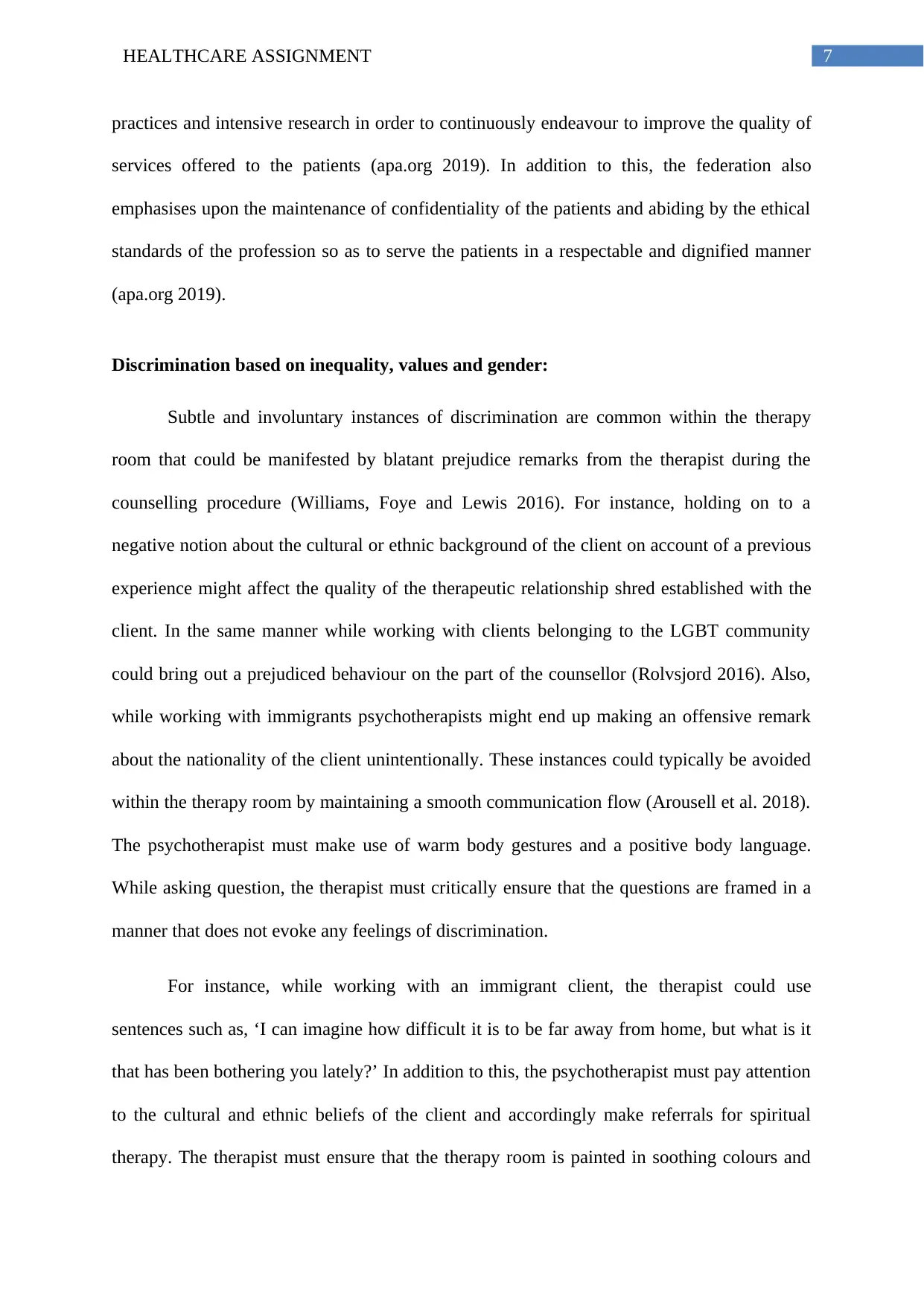
7HEALTHCARE ASSIGNMENT
practices and intensive research in order to continuously endeavour to improve the quality of
services offered to the patients (apa.org 2019). In addition to this, the federation also
emphasises upon the maintenance of confidentiality of the patients and abiding by the ethical
standards of the profession so as to serve the patients in a respectable and dignified manner
(apa.org 2019).
Discrimination based on inequality, values and gender:
Subtle and involuntary instances of discrimination are common within the therapy
room that could be manifested by blatant prejudice remarks from the therapist during the
counselling procedure (Williams, Foye and Lewis 2016). For instance, holding on to a
negative notion about the cultural or ethnic background of the client on account of a previous
experience might affect the quality of the therapeutic relationship shred established with the
client. In the same manner while working with clients belonging to the LGBT community
could bring out a prejudiced behaviour on the part of the counsellor (Rolvsjord 2016). Also,
while working with immigrants psychotherapists might end up making an offensive remark
about the nationality of the client unintentionally. These instances could typically be avoided
within the therapy room by maintaining a smooth communication flow (Arousell et al. 2018).
The psychotherapist must make use of warm body gestures and a positive body language.
While asking question, the therapist must critically ensure that the questions are framed in a
manner that does not evoke any feelings of discrimination.
For instance, while working with an immigrant client, the therapist could use
sentences such as, ‘I can imagine how difficult it is to be far away from home, but what is it
that has been bothering you lately?’ In addition to this, the psychotherapist must pay attention
to the cultural and ethnic beliefs of the client and accordingly make referrals for spiritual
therapy. The therapist must ensure that the therapy room is painted in soothing colours and
practices and intensive research in order to continuously endeavour to improve the quality of
services offered to the patients (apa.org 2019). In addition to this, the federation also
emphasises upon the maintenance of confidentiality of the patients and abiding by the ethical
standards of the profession so as to serve the patients in a respectable and dignified manner
(apa.org 2019).
Discrimination based on inequality, values and gender:
Subtle and involuntary instances of discrimination are common within the therapy
room that could be manifested by blatant prejudice remarks from the therapist during the
counselling procedure (Williams, Foye and Lewis 2016). For instance, holding on to a
negative notion about the cultural or ethnic background of the client on account of a previous
experience might affect the quality of the therapeutic relationship shred established with the
client. In the same manner while working with clients belonging to the LGBT community
could bring out a prejudiced behaviour on the part of the counsellor (Rolvsjord 2016). Also,
while working with immigrants psychotherapists might end up making an offensive remark
about the nationality of the client unintentionally. These instances could typically be avoided
within the therapy room by maintaining a smooth communication flow (Arousell et al. 2018).
The psychotherapist must make use of warm body gestures and a positive body language.
While asking question, the therapist must critically ensure that the questions are framed in a
manner that does not evoke any feelings of discrimination.
For instance, while working with an immigrant client, the therapist could use
sentences such as, ‘I can imagine how difficult it is to be far away from home, but what is it
that has been bothering you lately?’ In addition to this, the psychotherapist must pay attention
to the cultural and ethnic beliefs of the client and accordingly make referrals for spiritual
therapy. The therapist must ensure that the therapy room is painted in soothing colours and
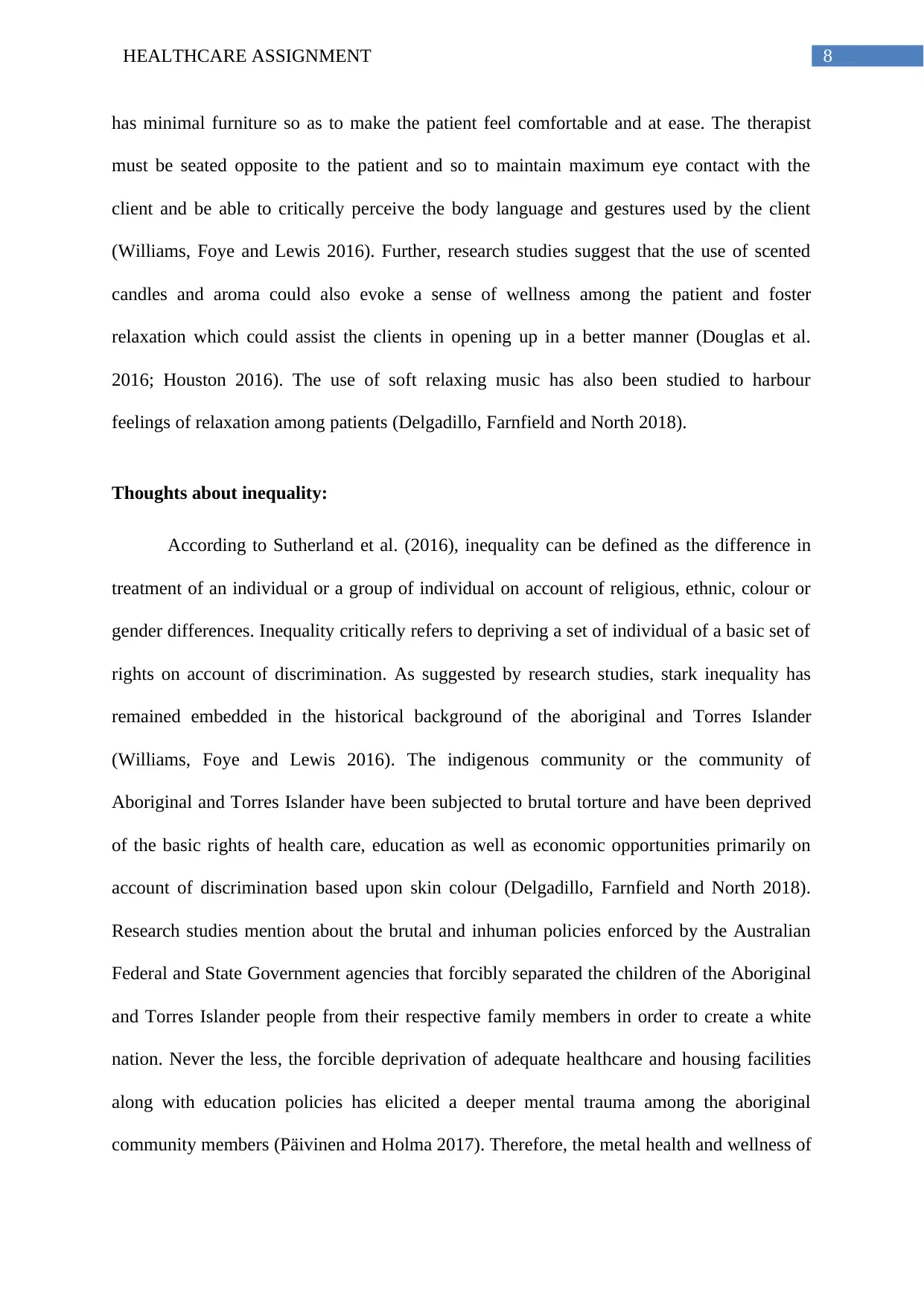
8HEALTHCARE ASSIGNMENT
has minimal furniture so as to make the patient feel comfortable and at ease. The therapist
must be seated opposite to the patient and so to maintain maximum eye contact with the
client and be able to critically perceive the body language and gestures used by the client
(Williams, Foye and Lewis 2016). Further, research studies suggest that the use of scented
candles and aroma could also evoke a sense of wellness among the patient and foster
relaxation which could assist the clients in opening up in a better manner (Douglas et al.
2016; Houston 2016). The use of soft relaxing music has also been studied to harbour
feelings of relaxation among patients (Delgadillo, Farnfield and North 2018).
Thoughts about inequality:
According to Sutherland et al. (2016), inequality can be defined as the difference in
treatment of an individual or a group of individual on account of religious, ethnic, colour or
gender differences. Inequality critically refers to depriving a set of individual of a basic set of
rights on account of discrimination. As suggested by research studies, stark inequality has
remained embedded in the historical background of the aboriginal and Torres Islander
(Williams, Foye and Lewis 2016). The indigenous community or the community of
Aboriginal and Torres Islander have been subjected to brutal torture and have been deprived
of the basic rights of health care, education as well as economic opportunities primarily on
account of discrimination based upon skin colour (Delgadillo, Farnfield and North 2018).
Research studies mention about the brutal and inhuman policies enforced by the Australian
Federal and State Government agencies that forcibly separated the children of the Aboriginal
and Torres Islander people from their respective family members in order to create a white
nation. Never the less, the forcible deprivation of adequate healthcare and housing facilities
along with education policies has elicited a deeper mental trauma among the aboriginal
community members (Päivinen and Holma 2017). Therefore, the metal health and wellness of
has minimal furniture so as to make the patient feel comfortable and at ease. The therapist
must be seated opposite to the patient and so to maintain maximum eye contact with the
client and be able to critically perceive the body language and gestures used by the client
(Williams, Foye and Lewis 2016). Further, research studies suggest that the use of scented
candles and aroma could also evoke a sense of wellness among the patient and foster
relaxation which could assist the clients in opening up in a better manner (Douglas et al.
2016; Houston 2016). The use of soft relaxing music has also been studied to harbour
feelings of relaxation among patients (Delgadillo, Farnfield and North 2018).
Thoughts about inequality:
According to Sutherland et al. (2016), inequality can be defined as the difference in
treatment of an individual or a group of individual on account of religious, ethnic, colour or
gender differences. Inequality critically refers to depriving a set of individual of a basic set of
rights on account of discrimination. As suggested by research studies, stark inequality has
remained embedded in the historical background of the aboriginal and Torres Islander
(Williams, Foye and Lewis 2016). The indigenous community or the community of
Aboriginal and Torres Islander have been subjected to brutal torture and have been deprived
of the basic rights of health care, education as well as economic opportunities primarily on
account of discrimination based upon skin colour (Delgadillo, Farnfield and North 2018).
Research studies mention about the brutal and inhuman policies enforced by the Australian
Federal and State Government agencies that forcibly separated the children of the Aboriginal
and Torres Islander people from their respective family members in order to create a white
nation. Never the less, the forcible deprivation of adequate healthcare and housing facilities
along with education policies has elicited a deeper mental trauma among the aboriginal
community members (Päivinen and Holma 2017). Therefore, the metal health and wellness of
⊘ This is a preview!⊘
Do you want full access?
Subscribe today to unlock all pages.

Trusted by 1+ million students worldwide
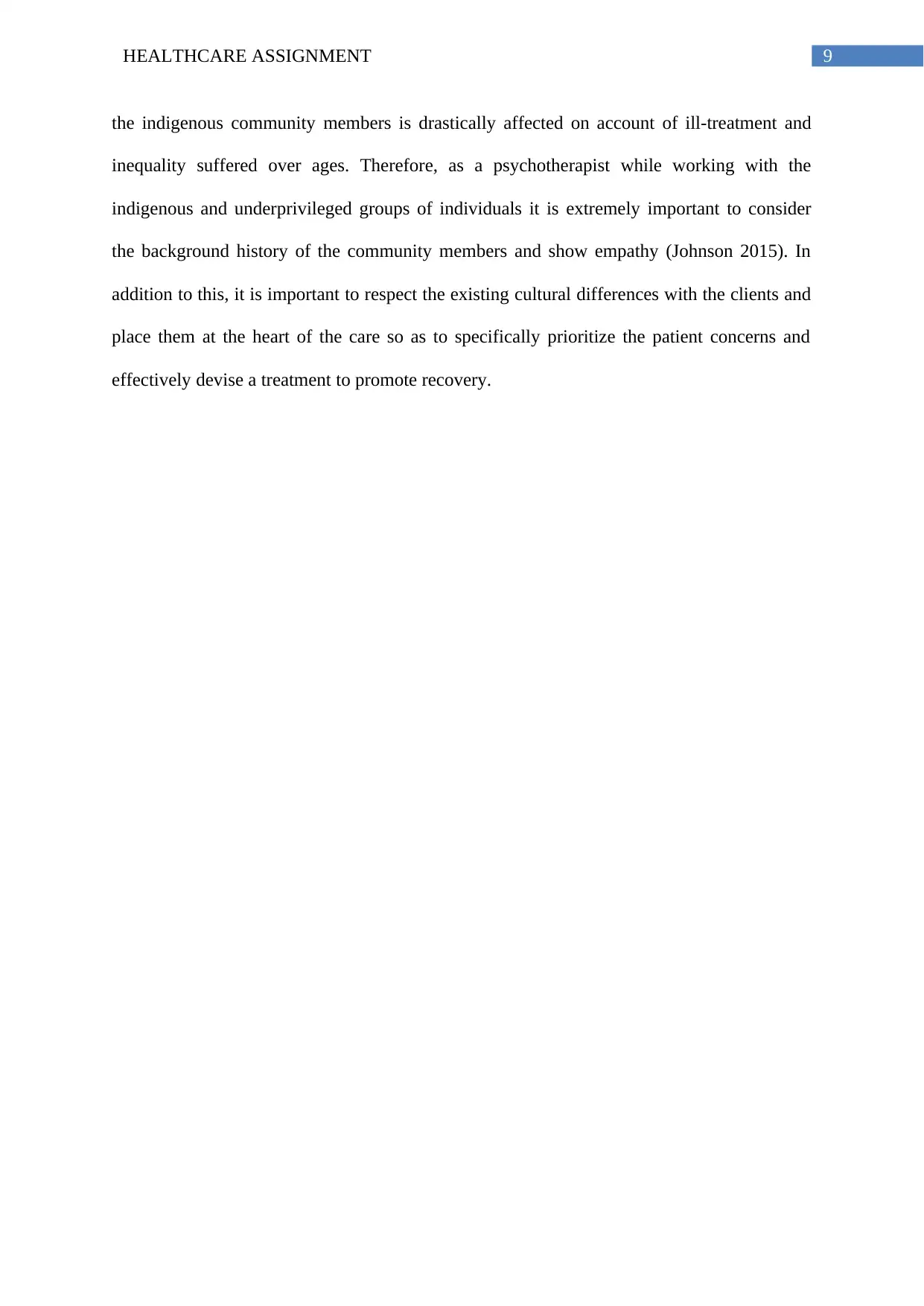
9HEALTHCARE ASSIGNMENT
the indigenous community members is drastically affected on account of ill-treatment and
inequality suffered over ages. Therefore, as a psychotherapist while working with the
indigenous and underprivileged groups of individuals it is extremely important to consider
the background history of the community members and show empathy (Johnson 2015). In
addition to this, it is important to respect the existing cultural differences with the clients and
place them at the heart of the care so as to specifically prioritize the patient concerns and
effectively devise a treatment to promote recovery.
the indigenous community members is drastically affected on account of ill-treatment and
inequality suffered over ages. Therefore, as a psychotherapist while working with the
indigenous and underprivileged groups of individuals it is extremely important to consider
the background history of the community members and show empathy (Johnson 2015). In
addition to this, it is important to respect the existing cultural differences with the clients and
place them at the heart of the care so as to specifically prioritize the patient concerns and
effectively devise a treatment to promote recovery.
Paraphrase This Document
Need a fresh take? Get an instant paraphrase of this document with our AI Paraphraser
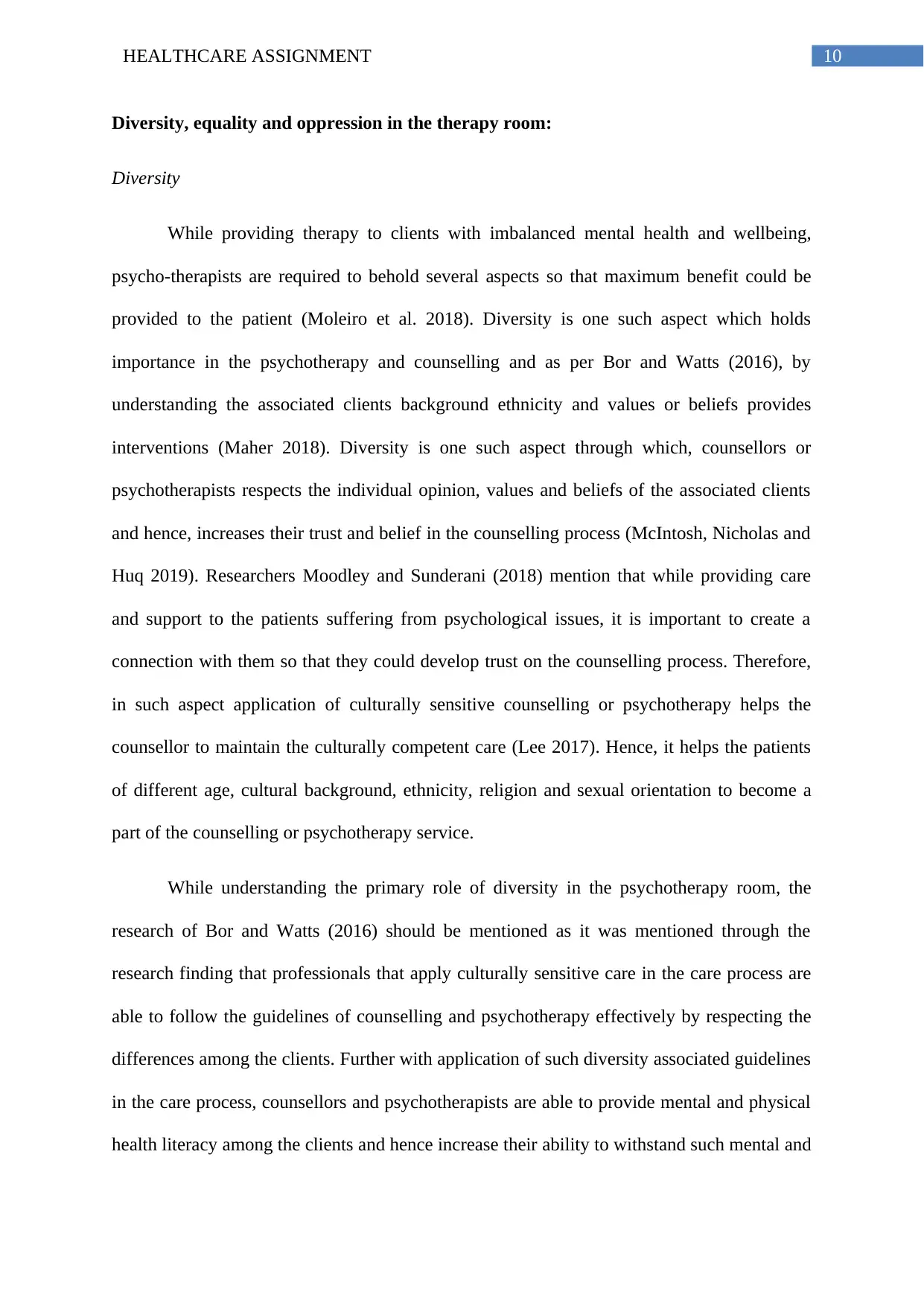
10HEALTHCARE ASSIGNMENT
Diversity, equality and oppression in the therapy room:
Diversity
While providing therapy to clients with imbalanced mental health and wellbeing,
psycho-therapists are required to behold several aspects so that maximum benefit could be
provided to the patient (Moleiro et al. 2018). Diversity is one such aspect which holds
importance in the psychotherapy and counselling and as per Bor and Watts (2016), by
understanding the associated clients background ethnicity and values or beliefs provides
interventions (Maher 2018). Diversity is one such aspect through which, counsellors or
psychotherapists respects the individual opinion, values and beliefs of the associated clients
and hence, increases their trust and belief in the counselling process (McIntosh, Nicholas and
Huq 2019). Researchers Moodley and Sunderani (2018) mention that while providing care
and support to the patients suffering from psychological issues, it is important to create a
connection with them so that they could develop trust on the counselling process. Therefore,
in such aspect application of culturally sensitive counselling or psychotherapy helps the
counsellor to maintain the culturally competent care (Lee 2017). Hence, it helps the patients
of different age, cultural background, ethnicity, religion and sexual orientation to become a
part of the counselling or psychotherapy service.
While understanding the primary role of diversity in the psychotherapy room, the
research of Bor and Watts (2016) should be mentioned as it was mentioned through the
research finding that professionals that apply culturally sensitive care in the care process are
able to follow the guidelines of counselling and psychotherapy effectively by respecting the
differences among the clients. Further with application of such diversity associated guidelines
in the care process, counsellors and psychotherapists are able to provide mental and physical
health literacy among the clients and hence increase their ability to withstand such mental and
Diversity, equality and oppression in the therapy room:
Diversity
While providing therapy to clients with imbalanced mental health and wellbeing,
psycho-therapists are required to behold several aspects so that maximum benefit could be
provided to the patient (Moleiro et al. 2018). Diversity is one such aspect which holds
importance in the psychotherapy and counselling and as per Bor and Watts (2016), by
understanding the associated clients background ethnicity and values or beliefs provides
interventions (Maher 2018). Diversity is one such aspect through which, counsellors or
psychotherapists respects the individual opinion, values and beliefs of the associated clients
and hence, increases their trust and belief in the counselling process (McIntosh, Nicholas and
Huq 2019). Researchers Moodley and Sunderani (2018) mention that while providing care
and support to the patients suffering from psychological issues, it is important to create a
connection with them so that they could develop trust on the counselling process. Therefore,
in such aspect application of culturally sensitive counselling or psychotherapy helps the
counsellor to maintain the culturally competent care (Lee 2017). Hence, it helps the patients
of different age, cultural background, ethnicity, religion and sexual orientation to become a
part of the counselling or psychotherapy service.
While understanding the primary role of diversity in the psychotherapy room, the
research of Bor and Watts (2016) should be mentioned as it was mentioned through the
research finding that professionals that apply culturally sensitive care in the care process are
able to follow the guidelines of counselling and psychotherapy effectively by respecting the
differences among the clients. Further with application of such diversity associated guidelines
in the care process, counsellors and psychotherapists are able to provide mental and physical
health literacy among the clients and hence increase their ability to withstand such mental and
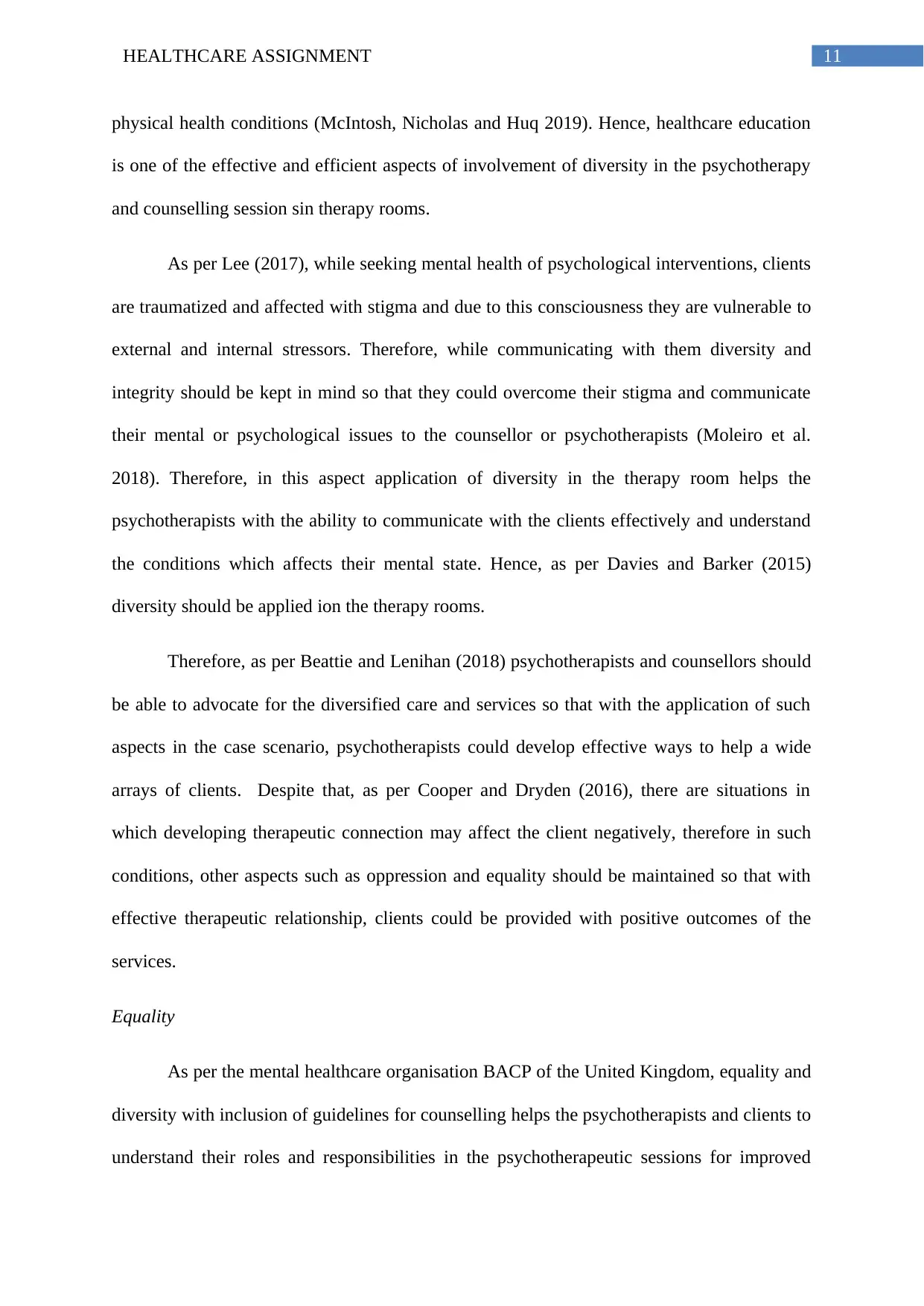
11HEALTHCARE ASSIGNMENT
physical health conditions (McIntosh, Nicholas and Huq 2019). Hence, healthcare education
is one of the effective and efficient aspects of involvement of diversity in the psychotherapy
and counselling session sin therapy rooms.
As per Lee (2017), while seeking mental health of psychological interventions, clients
are traumatized and affected with stigma and due to this consciousness they are vulnerable to
external and internal stressors. Therefore, while communicating with them diversity and
integrity should be kept in mind so that they could overcome their stigma and communicate
their mental or psychological issues to the counsellor or psychotherapists (Moleiro et al.
2018). Therefore, in this aspect application of diversity in the therapy room helps the
psychotherapists with the ability to communicate with the clients effectively and understand
the conditions which affects their mental state. Hence, as per Davies and Barker (2015)
diversity should be applied ion the therapy rooms.
Therefore, as per Beattie and Lenihan (2018) psychotherapists and counsellors should
be able to advocate for the diversified care and services so that with the application of such
aspects in the case scenario, psychotherapists could develop effective ways to help a wide
arrays of clients. Despite that, as per Cooper and Dryden (2016), there are situations in
which developing therapeutic connection may affect the client negatively, therefore in such
conditions, other aspects such as oppression and equality should be maintained so that with
effective therapeutic relationship, clients could be provided with positive outcomes of the
services.
Equality
As per the mental healthcare organisation BACP of the United Kingdom, equality and
diversity with inclusion of guidelines for counselling helps the psychotherapists and clients to
understand their roles and responsibilities in the psychotherapeutic sessions for improved
physical health conditions (McIntosh, Nicholas and Huq 2019). Hence, healthcare education
is one of the effective and efficient aspects of involvement of diversity in the psychotherapy
and counselling session sin therapy rooms.
As per Lee (2017), while seeking mental health of psychological interventions, clients
are traumatized and affected with stigma and due to this consciousness they are vulnerable to
external and internal stressors. Therefore, while communicating with them diversity and
integrity should be kept in mind so that they could overcome their stigma and communicate
their mental or psychological issues to the counsellor or psychotherapists (Moleiro et al.
2018). Therefore, in this aspect application of diversity in the therapy room helps the
psychotherapists with the ability to communicate with the clients effectively and understand
the conditions which affects their mental state. Hence, as per Davies and Barker (2015)
diversity should be applied ion the therapy rooms.
Therefore, as per Beattie and Lenihan (2018) psychotherapists and counsellors should
be able to advocate for the diversified care and services so that with the application of such
aspects in the case scenario, psychotherapists could develop effective ways to help a wide
arrays of clients. Despite that, as per Cooper and Dryden (2016), there are situations in
which developing therapeutic connection may affect the client negatively, therefore in such
conditions, other aspects such as oppression and equality should be maintained so that with
effective therapeutic relationship, clients could be provided with positive outcomes of the
services.
Equality
As per the mental healthcare organisation BACP of the United Kingdom, equality and
diversity with inclusion of guidelines for counselling helps the psychotherapists and clients to
understand their roles and responsibilities in the psychotherapeutic sessions for improved
⊘ This is a preview!⊘
Do you want full access?
Subscribe today to unlock all pages.

Trusted by 1+ million students worldwide
1 out of 25
Your All-in-One AI-Powered Toolkit for Academic Success.
+13062052269
info@desklib.com
Available 24*7 on WhatsApp / Email
![[object Object]](/_next/static/media/star-bottom.7253800d.svg)
Unlock your academic potential
Copyright © 2020–2026 A2Z Services. All Rights Reserved. Developed and managed by ZUCOL.

